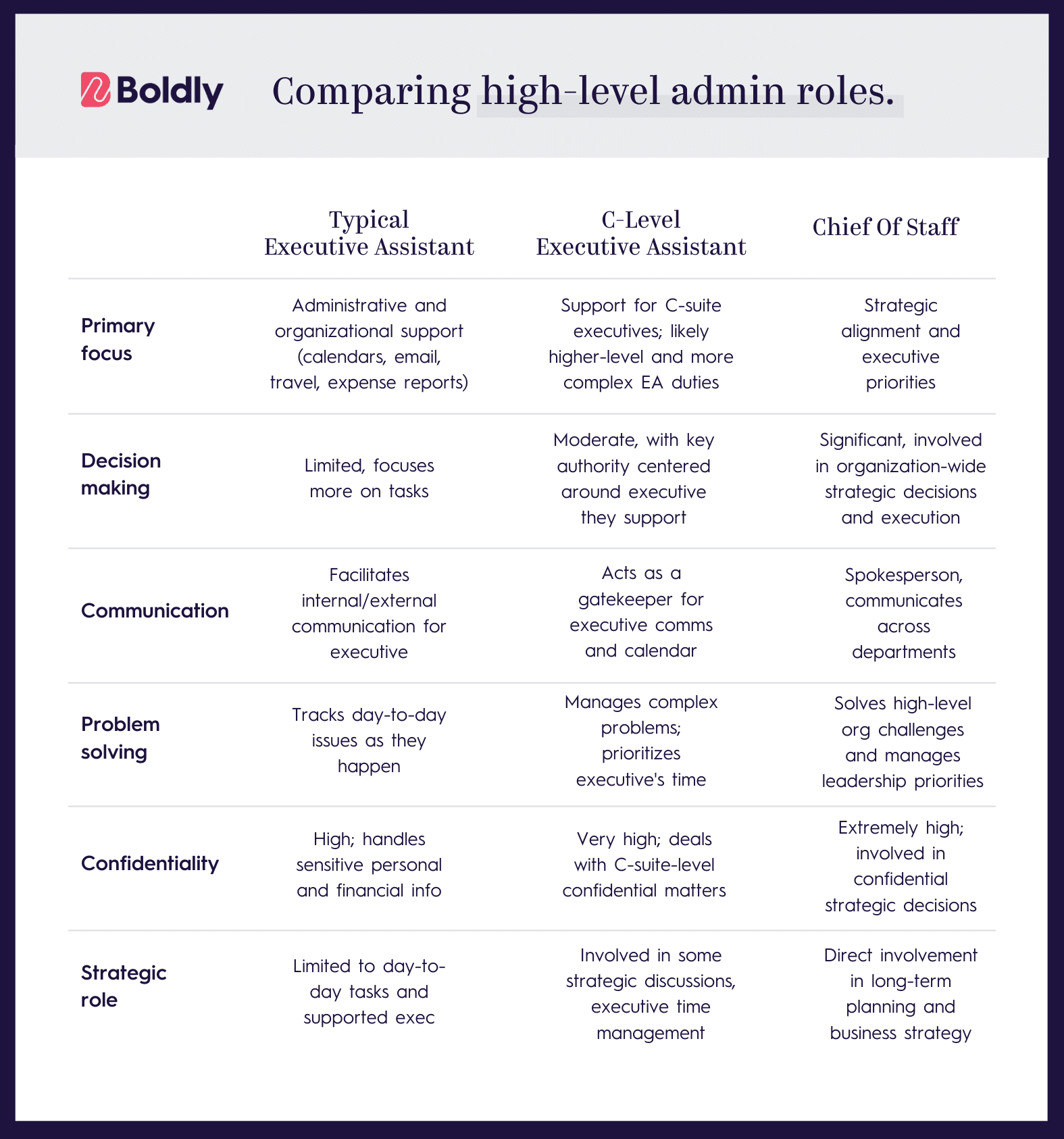C-level leaders have demanding jobs. And that translates to big demands of their executive assistants.
While on paper the job description can seem like a standard executive assistant role, the extra layer of complexity (and the ability to navigate through these challenges) sets an executive assistant for the CEO or ‘Founder-Level Executive’ apart. Everything, from calendar to inbox management, requires the utmost care and precision.
Imagine trying to schedule a meeting with 10-20 CEOs — all of whom are incredibly busy, with schedules to match. An executive assistant to the CEO (or other C-level executives) will know how to approach the seemingly impossible with tact and creativity.
A C-level executive assistant is a position that carries responsibilities that exceed what other types of assistants generally have, including other executive assistants who work with lower-level managers.
This rolls into big differences in expectations and in the potential impact an assistant has at that higher C-level of support.
Why Your C-Level Executive Support Matters
C-level executive support is a crucial aspect of any successful organization.
Your leaders need to stay focused on what they do best — which typically isn’t managing emails, scheduling and re-scheduling meetings, or booking travel.
C-suite assistants are pivotal to ensuring that top-level executives can focus on strategic decision-making and leadership.
Supporting C-level executives requires a unique skill set and a deep understanding of the organization’s goals and operations. Executive assistants in the C-Suite must be adept at managing complex schedules, facilitating communication, and anticipating the needs of their executives — all with the utmost discretion and tact.
Let’s take a closer look at what that strategic support looks like.
What Is A C-Level Executive Assistant?
A C-level executive assistant is one that is highly skilled, supporting the CEO and other high-level executives. The C-level is sometimes referred to as the C-Suite, and includes the most senior executives in a company.
It’s no surprise that the assistants supporting this leadership tier will also be high-level.
While a regular executive assistant and a C-level executive assistant are going to appear very similar in the skills and duties expected of them, the overarching difference is positional. A C-level executive assistant has a higher overarching view of the organization.
And that difference affects everything a C-level executive assistant does.
An executive assistant for a CEO (or other C-level exec) is a position that carries responsibilities that exceed what other types of assistants generally have, including other executive assistants who work with lower-level managers.
They provide direct reports to their high-level executive, working one-on-one in a capacity that far exceeds the demands of typical assistants. In some cases, they may even have their own assistants to help them in their work.


Because a C-level executive assistant is higher up the chain, everything they do has a much bigger impact than an executive assistant for lower-level executives or managers.
Read more: Chief of Staff vs. Executive Assistant
That means a C-level executive assistant needs to pair an in-depth understanding of the company with a strategic mindset. They are not there to just complete administrative tasks. They are part of top-level strategy.
The C-Level Executive Assistant’s Role
Though they are technically not the same role, a C-level executive assistant and a regular executive assistant have similar duties depending on their particular job description — the difference here, as mentioned above, is in increased complexity and scope.
- Scheduling. Managing the executive’s calendar, scheduling and preparing for meetings, and coordinating travel for C-level executives.
- Team coordination. Working with or managing other administrative staff or projects, which may include the executive’s personal assistant.
- Preparation. Creating materials necessary for meetings and presentations, including doing the research necessary for use in those materials, provide the executive with everything necessary to make decisions.
- Reports. Includes expense reports as well as reports the executive needs to stay on top of information required to do his/her job.
- Administration. Includes everything from managing petty cash, processing mail, or even replenishing or tracking supplies needed in the office. Light bookkeeping duties may be included.
- Communication. Responding to email, managing the executive’s inbox, taking phone calls, and in general, serving as a gatekeeper so that only the necessary communication comes via the C-Suite executive assistant.
- Serving on behalf. This may mean meeting with clients, returning communication, or relaying the executive’s wishes to reduce direct access to the executive.
- Contact management. More than simply maintaining a contact list (though that is part of it), contact management involves helping the executive know as much as possible about a contact to give context to communication and meetings.
- Problem solving. Being able to solve problems through critical and analytical thinking for decisive action. This is especially necessary for C-level executive assistants who may end up making managerial decisions at a moment that keeps a project moving forward.
- Technical skills. Able to use (or quickly learn to use) the various tools necessary for document creation, file management, meetings, communication, and archiving.
These are important roles to fulfill at any level, but even more so at the C-level.
So what is C-suite level executive assistant? What’s so unique about their role that sets them apart from other executive assistants if so many of the same skills and abilities are required of both of them?
The difference is found in the essential skills and experience that a C-level executive assistant must have.
The Assistant to the CEO: A Unique Position
Among C-Suite assistants, the assistant to the CEO holds a particularly crucial role.
This position requires an exceptional level of trust, discretion, and capability. The assistant to the CEO often acts as the CEO’s right hand, managing not only their schedule and communications but also serving as a strategic partner in many aspects of the business.
Key responsibilities of an assistant to the CEO include:
- Acting as a gatekeeper for the CEO’s time and attention
- Preparing briefings and reports for board meetings and other high-level discussions
- Coordinating with other c level executives and their assistants
- Managing special projects on behalf of the CEO
- Representing the CEO in certain meetings or communications
The role of an assistant to the CEO is often seen as a stepping stone to higher positions within the organization, as it provides unparalleled exposure to top-level decision-making and strategy.
Essential Skills For C-Level Executive Assistants
A C-level executive assistant is performing high-level administrative support to the C-suite, potentially reporting directly to the CEO. They are acting as a go-between with the board and other senior management team members. C-level executives have more people drawing on their time and attention, with the responsibility to make decisions that impact more people.
That means that everything a regular executive assistant does, a C-level executive assistant does to a greater degree, often with less time and more expectation pressures.
Unique Responsibilities And Duties
A C-level executive assistant requires a unique set of skills not required of other assistants because the kind of support they are providing has a higher impact than other assistants.
What is C level executive support? It looks like this:
- Discretion. They will be handling sensitive materials and information, some that could have significant legal or operational impact if mishandled. They are also a representative of their executive and the way they handle themselves reflects on the executive. Caution about what is said, and to whom, is necessary.
- Organization. They will be handling the incredibly complicated schedule of a C-level executive which means planning meetings and all travel details. A high level of organization is necessary to weave meetings and travel into the rest of the daily schedule of duties.
- Stress management. A fast-paced environment is the norm, and being able to handle the stress is necessary in order to meet deadlines and be sure the executive has everything necessary when needed to do their job at a high level of effectiveness.
- Self-motivated. Busy C-level executives don’t have time to create task lists. Executive assistants must learn to know what they want before they know it, spotting problems that need solving and work that must be completed before being told to do it.
- Business sense. They will be required to make decisions that are high-level at times, and must have a good sense of the priorities and preferences of their executive. They should have an understanding of corporate governance and expectations at the C-suite level, providing strategic support to their executive.
- Growth-minded. They must be able to accept feedback and not be afraid of a misstep knowing that being in a constant state of learning and pursuing excellence is more important than avoiding failure.
- Emotional intelligence. There will be a variety of people, from clients to team members, needing something from the executive. Having emotional intelligence is part of reading people and understanding how to draw the positive out and avoid creating conflict in a situation.
- Adaptability. A C-level executive assistant must be able to adapt to a changing landscape. Travel plans change, meetings fall through, information is needed yesterday. At that high level, they must be ready to shift gears or make quick decisions if a situation calls for it.
C-level executive assistants move far beyond performing clerical duties. There’s a reason they are the most highly skilled and highly paid assistants in the company. Their performance directly impacts the top executives, which has a direct effect on those below.
Required Experience And Background
A C-level executive assistant should have a college degree and no less than five years of experience working with the C-level, either directly as an EA or assisting the EA.
- Professional demeanor, in both appearance and communication.
- Knowledge of international or cultural differences.
- Technical skills, such as common business software and protocols.
- Sophisticated management and organizational abilities.
- Relevant industry background or knowledge for the company the executive works at.
Prior experience in high-level administrative support cannot be over-emphasized. Depending on the employer, salary may be tied to experience.
Last, a great executive assistant who knows how to “manage up” is a game-changer for any C-level leader.
They’re not just about schedules and emails; they think ahead, understand their executive’s style, and act before problems pop up. Because they’re proactive, they’re mavens at keeping communication smooth and clear, making sure everyone’s on the same page.
Executive assistants to the CEO do more than admin work, functioning as key players in making big plans happen.
A Career As A C-Level Executive Assistant
A career as a C-level executive assistant is one filled with excitement. But it’s also one that requires a dedication to constant learning, whether it’s on new tools or methods, such as using AI as an executive assistant, or improving leadership and interpersonal skills.
C-Level Executive Assistant Certification
Getting a C-level executive assistant certification may improve the chances of landing a premier position.
These credentials are earned after the executive assistant has completed a set program or exam. They are a tangible way to show that they have the skills necessary for the position. This is particularly useful for executive assistants with less experience looking to close the gap by showing both a desire to improve their skills as well as proof of their qualifications.
While there are several places to offer certification, look for those with high reviews and professional acknowledgments. Find one with a robust and challenging course that actually helps improve skills. An example would be ACEA or IEAA (for the UK), IAP, or through online classes from universities, such as UCLA.
Salary Expectations And Career Progression
In 2023, the average salary for a C-level executive assistant was $64K a year. That varies, however, because the potential salary for a C-level executive assistant is influenced by many factors, such as location, industry, and (as previously mentioned) experience.
As with any career, a love for the work is the only way to see progression. That must be mixed with a growth mentality or an attitude that embraces constant learning for improvement.
A C-level executive assistant position has high potential for advancement. It’s a position that exposes the assistant to top-shelf leaders with sharp business acumen. There will be networking and connection opportunities at a high level, as well as the opportunity to take on new duties within the company.
While the demands are high, the rewards of being an executive assistant for the CEO outweigh them. There are challenges that can come with working for high-performing leaders and adapting to the work style and personalities that got them to that level, but the opportunity to learn and grow is very real.
It’s important to remember that without C-level executive assistants, there would be no smooth functioning executive operations. It’s a career that, though often unsung, has an incredible impact.
How To Find And Hire A C-Level Executive Assistant
A C-Level executive assistant is a premium assistant.
You have a number of options when it comes to finding and hiring a C-level executive assistant. There’s the traditional route of creating and posting an executive assistant job description, interviewing candidates, and hiring someone to be available in the office.
On the other hand, you can work with a remote executive assistant company, however, you’ll need to be mindful of the experience level, quality, and legal compliance.
At Boldly, we provide premium executive assistants with 10-15 years of experience of high-level executive assistance, many at Fortune 500 companies. We recruit and hire specifically for the skills, maturity, and passion to move your business forward — without the headaches of hiring.




